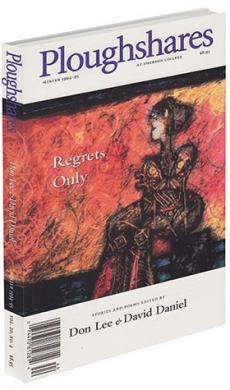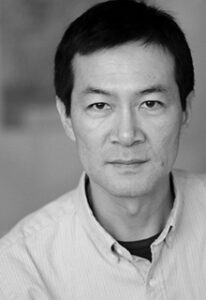rev. of Mercy Seat by Bruce Smith
Mercy Seat
Poems by Bruce Smith. Univ. of Chicago, $9.95 paper. Reviewed by David Rivard.
In the epigraph to a poem called “Self-Portrait as Ornette Coleman,” Bruce Smith quotes the legendary saxophonist as saying of Spike Jones’s treatment of an old standard, “He’d take ‘Stardust’ and run a saw through it then come back with the melody.” This might also describe Bruce Smith’s method in his third — and best — book of poems,
Mercy Seat: the tune that Smith riffs off of is the history of anyone “growing up white male North American” in the fifties and sixties, and the buzz saw he uses is a style of expressive disarrangement honed by a slyly formal sense of craft.
Wicked, we used to say growing up, and that’s the way I think of Bruce Smith’s work.
The disturbed and disturbing energy of
Mercy Seat comes in part from the tension between Smith’s ear for American idiom and the orchestrations against which he casts that idiom. The off-kilter swervings through varied intonations, the humming into lyrical flight, the montaging of image and metaphor, all are held together by elemental concerns for song. The effect is akin to that of stride piano — the left hand laying down a kind of bass line while the right flies out on the melody, a melody made out of slurred notes and bent phrasings. One of Smith’s favored formal devices is the rhymed couplet: “What was the question, the tune, the equation / of the new physics? What was the variation, / / the chord change, the rumor, the murmur / against the maker? / / We went to the funeral in 4 /4 time / to the slow Napoleonic drums and the urge of Rome, / / but we returned in 2 /4 to
Didn’t He Ramble? / to hold ourselves and scuffle and tremble” (“Against the Maker”). The result is both mournful and jubilant, like a second-line strut.
The source of Smith’s expressiveness feels more cultural than personal, shaped by our times — our parents and family more or less as real in the inner-life as Vietnam, race riots, James Brown, the SALT talks, Quaker Oats, Attica, etc. There is a moment in “The Sandwiches,” one of the book’s many sonnets, where Smith makes a little secular theology out of eating at a football game while watching “the great Bednarik, MacDonald, and Jurgenson” and seeing “what our god was” — I confess to being thrilled by seeing Sonny Jurgenson and God inextricably linked. For Smith, “our faces come from movies, the dim business / of action lit and twisted.” Not just movies,
Mercy Seat makes clear, but from all the machinery of the age of information and entertainment. In one sense, the book is about the birth of this age.
The book is also about birth in the making and remaking of self-identity out of the weather of our times: “He would be either a standard of living or a cold war. / He would be either a peaceful ocean or, in the worst / version of their plan he would be a wall shadow and strontium / 90 falling from the unprotected heaven with the rain . . . ,” Smith says in “Self-Portrait as Foreign Policy.” In a poem called “In the City of Brotherly Love,” he shows himself as one of two brothers listening in the dark to a radio, who “crossed the borders of oblivious / and white, then got back with the news of the Black Jesus / / and the
please, please, please and the standard mama-jama / alto badness we received from WHAT in Philadelphia.” And in the book’s sweetest and most moving poem, “Mercy,” he waits for the birth of his daughter “in the unscrubbed father room / with the Jamaican and Puerto Rican (What island / was I?),” his daughter about to be born in a hospital “across from the Audubon Ballroom where Malcolm X was shot,” born into a country where “our paradise is our bondage is our paradise,” where “what I must do is hold / you, nervous, then let you go, but not / yet, little white girl, my Moses.”
Mercy Seat is filled with poems of consequence and intelligence, dark humor, and a vision as strange as the 1990’s. Bruce Smith’s voice is singular and true.
David Rivard’s collection, Torque,
was published in the Pittsburgh Poetry Series. He teaches at Tufts University and Vermont College.


